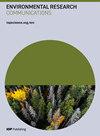Downhill skiing & climate change adaptation in Wisconsin: perspectives from key stakeholders
IF 2.9
4区 环境科学与生态学
Q3 ENVIRONMENTAL SCIENCES
引用次数: 0
Abstract
Climate change is currently impacting various facets of our local systems with many stakeholders and industries working to adapt to these changing conditions. There is a growing recognition that adaptation practices need to be directed within specific industries, communities, and stakeholders. A key area that is being impacted is the snow sports industry which is facing various challenges due to localized climatic changes. Previous work has indicated that climate change may leave these snow-dependent industries in the U.S. Midwest unviable in the future, so it is imperative to understand how these stakeholders are adapting to climate change and how they view the future of their industry. To do this, we conducted in-depth interviews with owners and operators in Wisconsin to understand 1) the climate change impacts they are facing, 2) their adaptation strategies, and 3) their views of the future of Wisconsin downhill skiing. Our results outline various environmental and social changes that participants associate with climate change and document their current adaptation strategies. Operators are optimistic about the future, but there is a recognition that adaptation practices and planning will likely intensify. This letter concludes with an outline for future research and support for adaptation practices that blend qualitative methods with physical and technological research that can aid this industry’s adaptation strategies.威斯康星州的下坡滑雪与气候变化适应:主要利益相关者的观点
气候变化目前正在影响我们当地系统的各个方面,许多利益相关者和行业都在努力适应这些不断变化的条件。越来越多的人认识到,需要在特定行业、社区和利益相关者中开展适应性实践。受到影响的一个关键领域是雪上运动行业,该行业正面临着本地气候变化带来的各种挑战。先前的研究表明,气候变化可能会使美国中西部这些依赖雪的行业在未来无法生存,因此,了解这些利益相关者如何适应气候变化以及他们如何看待其行业的未来势在必行。为此,我们对威斯康星州的业主和经营者进行了深入访谈,以了解:1)他们面临的气候变化影响;2)他们的适应策略;3)他们对威斯康星州山地滑雪未来的看法。我们的研究结果概述了参与者认为与气候变化相关的各种环境和社会变化,并记录了他们当前的适应策略。经营者对未来持乐观态度,但也认识到适应实践和规划可能会加强。本信最后概述了未来的研究,并支持将定性方法与物理和技术研究相结合的适应实践,以帮助该行业制定适应战略。
本文章由计算机程序翻译,如有差异,请以英文原文为准。
求助全文
约1分钟内获得全文
求助全文

 求助内容:
求助内容: 应助结果提醒方式:
应助结果提醒方式:


